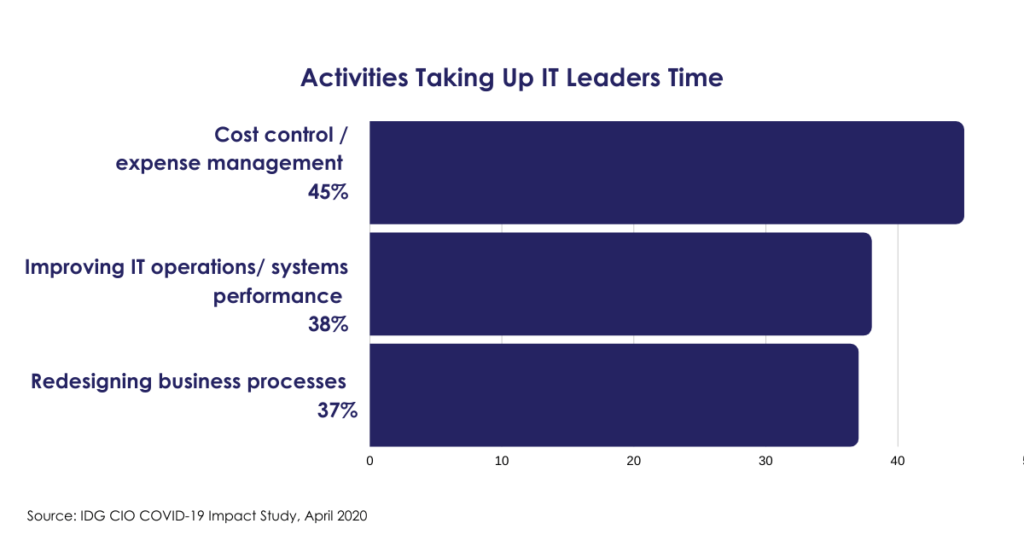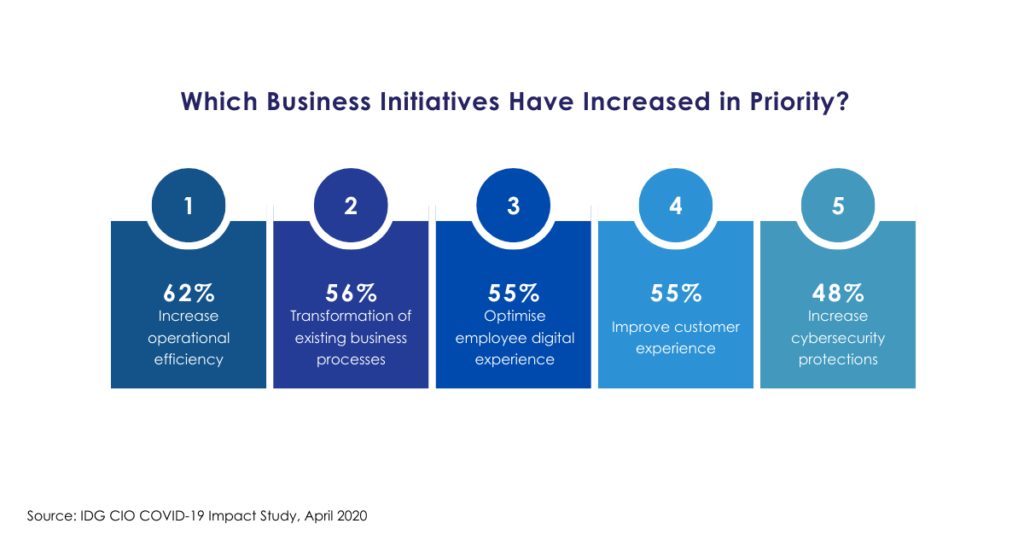As organisations transition to a new normal, CIOs find themselves redefining IT priorities. Focused on managing the operational challenges of the crisis, they now also need to review IT costs, assess and understand the context in which the business strategy will develop and decide where cuts or investment are required. CIOs encounter a scenario with new points of view on the future of the work and the workplace, budgets prone to constant change and an increasing need to refine business processes with systems to adapt and evolve. Several patterns emerge according to a recent survey conducted by IDG Research CIO COVID-19 Impact Study in mid-April, aiming to understand how the current COVID-19 pandemic is affecting IT leaders’ roles, priorities, and expected long-term effects on their IT organisation and businesses they support as a whole.
Changing Spending Priorities and Redefining Business Processes
The IDG CIO COVID-19 Impact Study surveyed 414 IT execs, managers, and business professionals. It doesn’t come as a surprise that the survey found that most budgets will either hold steady or decrease in the next 12 months. Only 25 per cent of them expect an increase in their IT spending in the next year, a sharp fall from 59 per cent in December 2019 when many organisations were actively researching innovative solutions such as 5G, RPA, AI, machine learning, and IoT. Similarly, those who contemplate a decrease in their spending rose from 7 per cent to 39 per cent in April 2020.
With the new reality being working from home, which in some cases could become permanently the new normal, it is expected to impact office space, technology and overall staff planning. The increased budgets in a few sectors are being used to increase remote work capabilities. One of the survey questions asked how IT leaders planned to spend any savings from increased operational efficiency. In response, 52 per cent said they were likely to invest in ‘new/upgraded technology to improve security’, the second choice was ‘new technologies to improve customer engagement/satisfaction’. Digital transformation actually tied with ‘improving remote work experiences’ as the number one priority among those surveyed. About 71 per cent agreed with the statement that “the current WFH shift has created a more positive view of remote workplace policies and will likely impact how we plan for office space, tech staffing, and overall staffing in the future’.

When asked what their CEO’s top priorities for IT are to help the business through the current and post COVID19 disruption, the focus on leading digital transformation initiatives remains the same as six months ago now along with improving the remote work experience, for the customer and workforce.
Nearly half of the IT leaders said they would focus long term on cost control and expense management. A majority of CIOs are also redefining business processes going forward.

Business Process Mapping
Business process mapping and mining in a framework can help organisations visualise processes to identify areas of improvement in their current business processes, streamline flows of data, and define optimisation opportunities for continuous improvement. By understanding processes from start to finish, every aspect of a process can then be more efficient, identify wasteful tasks and gain valuable insights and transparency into the daily business and customer facing operations.
AMOBI Methodology
VIP Apps Consulting’s approach to business process optimisation and redesign, is the AMOBI way, a methodology that focuses on the ‘holistic’ business.

Our AMOBI Assess phase helps to target the key pain points whether that be inefficient workflows or process steps using event-based flow mapping, and then benchmarking any changes against real business transactions and behaviours. This enables us to optimise the way the business engages with the technology to meet goals and customer demands. The AMOBI way facilitates a collaborative approach between the business organisation, the systems that support it and the project organisation tasked with designing and implementing improved or optimised processes.
Conclusion
COVID-19 is creating lasting changes in the way we work, with more organisations embracing remote work and the need to prioritise initiatives to become digital businesses. CIOs and IT leaders will need to adopt a continuous assessment mindset to strengthen the organisation’s resiliency, reduce costs thoughtfully, while also positioning the organisation to drive innovation for the next normal. Combined with a drive to business processes transformation and enhanced digital efficiency opens the door for innovation, like propelling the adoption of automation.
About VIP Apps Consulting
VIP Apps Consulting provide business process management and technology consulting services. We operate in the intersection of technology and business, combining deep business and industry insight with the understanding of how technology and innovation impact the industry and business model. Our unique process-driven approach and AMOBI and DELIVER proprietary methodologies deliver greater value and efficient business outcomes, minimising cost and risk. Our team has extensive experience within the leasing and financial services industry with the knowledge, capabilities and operational expertise, to help organisations assess and implement changes.
Get more insight like this
in your inbox
Subscribe to our mailing list and get industry and technology insights and updates to your email inbox.
Thank you for subscribing.
Something went wrong.
The form collects name and email so that we can add you to our newsletter list for updates. Checkout our privacy policy to learn how we protect and manage your submitted data.
Source:
https://www.idg.com/how-are-it-leaders-responding-to-the-pandemic/







